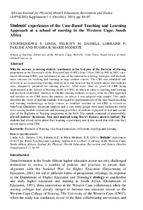| dc.contributor.author | Marie-Modeste, Regis R. | |
| dc.contributor.author | Linda, Ntombizodwa S. | |
| dc.contributor.author | Fakude, Lorraine | |
| dc.contributor.author | Daniels, Felicity M. | |
| dc.date.accessioned | 2015-05-19T09:31:39Z | |
| dc.date.available | 2015-05-19T09:31:39Z | |
| dc.date.issued | 2014 | |
| dc.identifier.citation | Linda, N.S. (2014). Students’ experiences of the Case-Based Teaching and Learning Approach at a school of nursing in the Western Cape, South Africa. African Journal for Physical, Health Education, Recreation and Dance, October (Supplement 1:1), 84-95. | en_US |
| dc.identifier.issn | 1117-4315 | |
| dc.identifier.uri | http://hdl.handle.net/10566/1468 | |
| dc.description.abstract | With the increase in nursing students’ enrolments in the first year of the Bachelor of Nursing programme at the University of the Western Cape (UWC) from 150 in 2003 to 300 in 2005, case-based education (CBE) was introduced as one of the innovative teaching strategies and methods more relevant for teaching and learning in large student classes. The CBE was identified and selected as an overarching teaching strategy as it was believed that it would ensure that students were adequately prepared for nursing practice. After more than six years of CBE being implemented at the School of Nursing (SoN) at UWC, its inherent value to teaching and learning had not been established. Answers to whether nursing students, as users, value the CBE approach and whether or not CBE meets the purpose for which it was adopted were sought. This study describes the views of nursing students with regard to implementation of the case-based teaching and learning methodology in large classes to establish whether or not CBE is viewed as beneficial. Qualitative document analysis and a case study design were used. Inclusion criteria were nursing module evaluations and learning portfolios of students registered in first and second year of the Bachelor of Nursing programme at the SoN. The sample consisted of purposefully selected students’ documents. Data were analysed using Tesch’s thematic analysis method. The students had mixed views about their learning experiences, and it was noted that with time they started appreciating CBE. | en_US |
| dc.language.iso | en | en_US |
| dc.publisher | AFAHPER-SD | en_US |
| dc.rights | Allows authors to put the published version of their articles in the open access institutional repositories. | |
| dc.subject | Bachelor of Nursing | en_US |
| dc.subject | Case-based education | en_US |
| dc.subject | Reflections | en_US |
| dc.subject | Teaching and learning | en_US |
| dc.title | Students’ experiences of the Case-Based Teaching and Learning Approach at a school of nursing in the Western Cape, South Africa | en_US |
| dc.type | Article | en_US |
| dc.privacy.showsubmitter | false | |
| dc.status.ispeerreviewed | true | |
| dc.description.accreditation | Department of HE and Training approved list | en_US |

